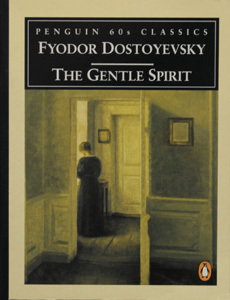 Dostoevsky is one of my favourite writers. I discovered him in my teenage years, read as many of his books as I could get my hands on, and to be honest haven’t read anything else by him in a long time. I still count him as one of my favourite writers, though, more on memory than anything else. His writing is so urgent and immediate, and began to open up a world for me beyond 1990s South London.
Dostoevsky is one of my favourite writers. I discovered him in my teenage years, read as many of his books as I could get my hands on, and to be honest haven’t read anything else by him in a long time. I still count him as one of my favourite writers, though, more on memory than anything else. His writing is so urgent and immediate, and began to open up a world for me beyond 1990s South London.
The Gentle Spirit is very short – longer than a short story, but barely long enough to be called a novella. Because of this, it doesn’t have the grand scale of Dostoevsky’s longer works. But it does succeed in its aim – to get inside the head of a pawnbroker as he watches his dead wife laid out on the table in front of him, the wife that he has recently driven to suicide.
The language reflects the disordered state of the character’s mind as he tries to understand what has happened. He asks questions, changes his mind, berates himself for going too fast or too slow or missing the point, and is always alternating between self-justification and self-flagellation. It’s a convincing portrait.
The wife’s character is not so clear, but in a way that’s the point. The pawnbroker did not understand her – still doesn’t, really. Because we see the world entirely through his eyes, our view is very limited and distorted. His wife is the “gentle spirit” of the book’s title, much younger than he is and perhaps a little naive in her expectations of him, but beyond that we discover little about her.
Even the pawnbroker’s own motives are not very clear – he decided from the start of the marriage to be “stern” with her and to withhold love and affection, but the only reason given for this is that it’s what he was used to from his job – a pawnbroker has to be stern with his customers, and not allow himself to be emotionally involved in their plight. Perhaps Dostoevsky is saying that after cutting himself off from people in this way for so many years, he was unable to achieve intimacy with another human being. By the time he does realise his mistake and declare his love for her, it is too late and too extreme – after months of not speaking to her at all, he suddenly throws himself at her feet and tells her everything. Whereas at the beginning she would have welcomed this display of love, after everything she’s been through it just frightens her and drives her away from him.
This was a quick and enjoyable read, and was probably the right length – because of the limitations of the pawnbroker’s perspective, it might be tough to read a whole novel based inside his head. In this short book, though, the style worked very well, and although I didn’t really understand either character very well, they felt real to me. Now I feel inspired to go back and re-read some of those novels I loved all those years ago.



There is 1 comment
Dostoevsky is one of my all time favorites, as well. I haven’t read this novelette, but it sounds like I NEED to. It sounds absolutely amazing. This is why I love Dostoevsky. He explores the human psyche like no other author I’ve ever read. Crime and Punishment is my all-time favorite.
Thank you for sharing this! I’m going to add this to my to-be-read list. I need to get lost in a Russian author again.